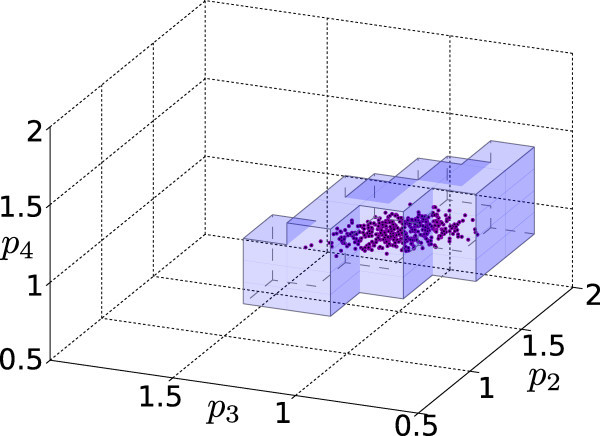Theory-orientated: Development of Set-based Methods for Parameter Estimation Considering Uncertainties

Project description
Lately, a method which introduces binary variables to represent logical relations in models was developed in our group [3]. This allows to combine qualitative statements such as "if x is present, then formation of y is reduced" with quantitative models.
Aims of the project and prerequisites
- development of new methods for set-based parameter estimation and identification, e.g. extension of [3]
- implementation of the methods in a Matlab-based toolbox for systems analysis and demonstration by means of selected and relevant examples, e.g. from systems biology [4,5]
For a successful project, the student should have
- strong interest in theoretical work
- good knowledge of systems and control theory
- good knowledge of MatLab.
Beginning
Contact
References
- [1] Rudolph, N., Meyer, T., Franzen, K., Garbers, C., Streif, S., Schaper, F., Dittrich, A. and Findeisen, R., A Two-level Approach for Fusing Early Signaling Events and Long Term Biological Responses. In International Symposium on Advanced Control of Chemical Processes (ADCHEM), pages 1229-1234, Whistler, Canada, June 2015.
- [2] Streif, S., Strobel, N. and Findeisen, R., Inner Approximations of Consistent Parameter Sets Via Constraint Inversion and Mixed-integer Linear Programming. In Proc. of the 12th IFAC Symposium on Computer Applications in Biotechnology (CAB), pages 326-331, Mumbai, India, December 2013.
- [3] Rumschinski, P., Borchers, S., Bosio, S., Weismantel, R. & Findeisen, R., Set-based dynamical parameter estimation and model invalidation for biochemical reaction networks.BMC Syst Biol, 2010, Vol. 4, pp. 69
- [4] Rumschinski, P., Borchers, S., Bosio, S., Weismantel, R. & Findeisen, R., Set-based dynamical parameter estimation and model invalidation for biochemical reaction networks.BMC Syst Biol, 2010, Vol. 4, pp. 69
- [5] Henrion, D. and Lasserre, J.-B., Detecting global optimality and extracting solutions in GloptiPoly. Lecture Notes on Control and Information Sciences, 2005, Vol. 312, Springer Verlag, Berlin
- [6] Rumschinski, P., Streif, S., Findeisen, R., Combining qualitative information and semi-quantitative data for guaranteed invalidation of biochemical network models. International Journal of Robust and Nonlinear Control, 2012, Vol. 22, pp. 1157-1173
- [7] Streif, S., Savchenko, A., Rumschinski, P., Borchers, S. and Findeisen, R., ADMIT: a toolbox for guaranteed model invalidation, estimation and qualitative-quantitative modeling. Bioinformatics, 2012, 28(9):1290-1291. [5] Palsson, B. O. and Lightfoot, E. N. Mathematical modeling of dynamics and control in metabolic networks. I. On Michaelis-Menten kinetics, Journal of Theoretical Biology, 1984, Vol. 111, pp. 273 – 302
- [8] Palsson, B. O. and Lightfoot, E. N., Mathematical modeling of dynamics and control in metabolic networks. I. On Michaelis-Menten kinetics, Journal of Theoretical Biology, 1984, Vol. 111, pp. 273 – 302
[an error occurred while processing this directive]